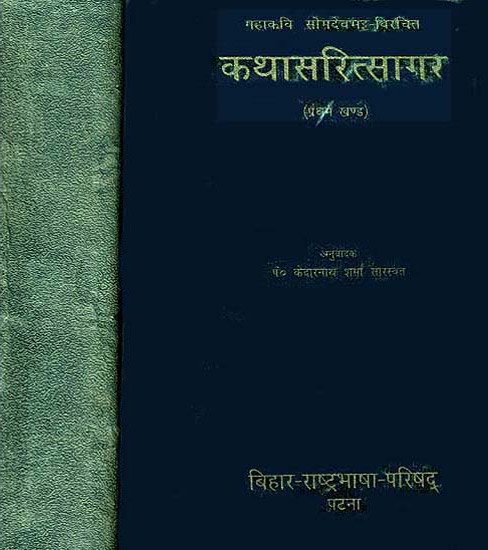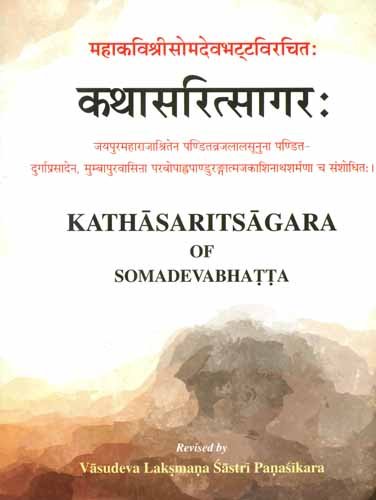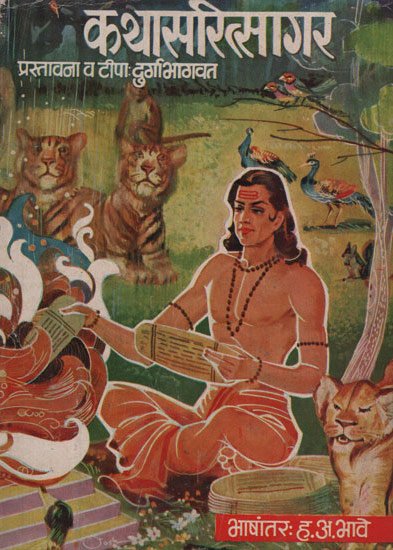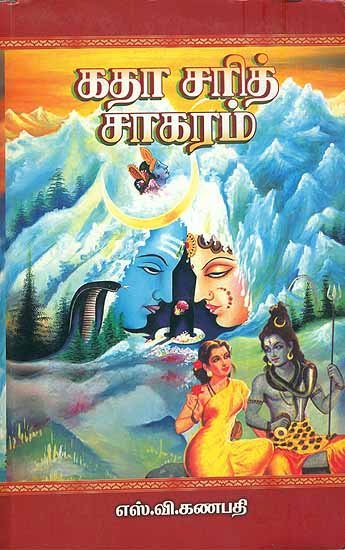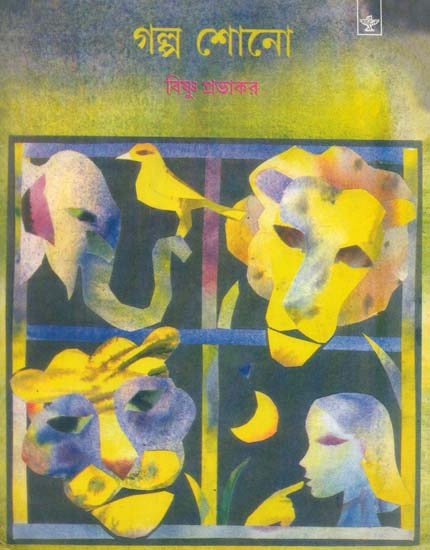Kathasaritsagara [sanskrit]
by C. H. Tawney | 2014 | 226,424 words | ISBN-13: 9789350501351
The Sanskrit edition of the Kathasaritsagara referencing the English translation and grammatical analysis. Written by Somadeva and dating from the 12th century, the Kathasaritsagara (or Katha-sarit-sagara) represents an epic legend narrating the adventures of Naravahanadatta as he strives to become the destined emperor of the Vidyadharas. Alternative titles: (Kathāsaritsāgara, कथासरित्सागर, Kathā-sarit-sāgara)
Verse 18.2.280
भूमिः सैन्यमयी तदुत्थितमहाशब्दैकमय्यो दिशः संसर्पद्ध्वजिनीविमर्दविलसद्द्धूलीमयी द्यौरपि ।
सर्वस्याद्भुततत्प्रभावमहिमव्याहारमय्यो गिरस् तस्मिन् राज्ञि पथि प्रयाति सकलद्वीपाधिनाथे ऽभवन् ॥ २८० ॥
bhūmiḥ sainyamayī tadutthitamahāśabdaikamayyo diśaḥ saṃsarpaddhvajinīvimardavilasadddhūlīmayī dyaurapi |
sarvasyādbhutatatprabhāvamahimavyāhāramayyo giras tasmin rājñi pathi prayāti sakaladvīpādhināthe 'bhavan || 280 ||
The English translation of Kathasaritsagara Verse 18.2.280 is contained in the book The Ocean of Story by C.H. Tawney. This book is available online or you could buy the latest edition:
Read online Buy now! The English translation by C.H. Tawney (2014)
Glossary of Sanskrit terms
Note: This extracts Sanskrit terms and links to English definitions from the glossary, based on an experimental segmentation of verse (18.2.280). Some terms could be superfluous while some might not be mentioned. Click on the word to show English definitions.
Bhumi, Sainyamayi, Tad, Tat, Utthita, Aha, Ashabda, Ekamayi, Dishas, Dish, Disha, Div, Dyau, Api, Sarva, Adbhuta, Prabhava, Ahima, Vyaharamayi, Gir, Gira, Rajan, Rajni, Pathin, Pathi, Prayati, Sakala, Dvipa, Adhinatha,
Analysis of Sanskrit grammar
Note: this is an experimental feature and only shows the first possible analysis of the Sanskrit text (Kathasaritsagara Verse 18.2.280). If the system was successful in segmenting the sentence, you will see of which words it is made up of, generally consisting of Nouns, Pronouns, Verbs, Participles and Indeclinables. Click on the link to show all possible derivations of the word.
- Line 1: “bhūmiḥ sainyamayī tadutthitamahāśabdaikamayyo diśaḥ saṃsarpaddhvajinīvimardavilasadddhūlīmayī dyaurapi ”
- bhūmiḥ -
-
bhūmi (noun, feminine)[nominative single]bhūmi (noun, masculine)[nominative single]
- sainyamayī -
-
sainyamayī (noun, feminine)[compound], [nominative single]
- tad -
-
tad (indeclinable)[indeclinable]tad (indeclinable adverb)[indeclinable adverb]tat (indeclinable correlative)[indeclinable correlative]tad (noun, neuter)[compound], [nominative single], [accusative single]
- utthitam -
-
utthita (noun, masculine)[adverb], [accusative single]utthita (noun, neuter)[adverb], [nominative single], [accusative single]utthitā (noun, feminine)[adverb]
- ahā -
-
aha (noun, neuter)[compound], [vocative single]
- aśabdai -
-
aśabda (noun, masculine)[compound], [vocative single]aśabda (noun, neuter)[compound], [vocative single]aśabdā (noun, feminine)[nominative single]
- ekamayyo* -
-
ekamayī (noun, feminine)[nominative plural], [vocative plural]
- diśaḥ -
-
diśas (noun, feminine)[compound], [vocative single]diś (noun, feminine)[nominative plural], [vocative plural], [accusative plural], [ablative single], [genitive single]diśa (noun, masculine)[nominative single]
- Cannot analyse saṃsarpaddhvajinīvimardavilasadddhūlīmayī*dy
- dyaur -
-
div (noun, masculine)[nominative single], [vocative single]dyau (noun, masculine)[nominative single], [vocative single]
- api -
-
api (indeclinable preposition)[indeclinable preposition]ap (noun, neuter)[locative single]api (Preverb)[Preverb]
- Line 2: “sarvasyādbhutatatprabhāvamahimavyāhāramayyo giras tasmin rājñi pathi prayāti sakaladvīpādhināthe 'bhavan ”
- sarvasyā -
-
sarva (noun, masculine)[genitive single]sarva (noun, neuter)[genitive single]
- adbhuta -
-
adbhuta (noun, masculine)[compound], [vocative single]adbhuta (noun, neuter)[compound], [vocative single]
- tat -
-
tat (indeclinable correlative)[indeclinable correlative]tad (noun, neuter)[compound], [nominative single], [accusative single]
- prabhāvam -
-
prabhāva (noun, masculine)[adverb], [accusative single]
- ahima -
-
ahima (noun, masculine)[compound], [vocative single]ahima (noun, neuter)[compound], [vocative single]
- vyāhāramayyo* -
-
vyāhāramayī (noun, feminine)[nominative plural], [vocative plural]
- giras -
-
gir (noun, feminine)[nominative plural], [vocative plural], [accusative plural], [ablative single], [genitive single]gir (noun, masculine)[nominative plural], [vocative plural], [accusative plural], [ablative single], [genitive single]gir (noun, neuter)[ablative single], [genitive single]gira (noun, masculine)[nominative single]
- tasmin -
-
tad (noun, neuter)[locative single]sa (noun, masculine)[locative single]
- rājñi -
-
rājñī (noun, feminine)[adverb], [vocative single]rājan (noun, masculine)[locative single]
- pathi -
-
pathin (noun, masculine)[compound], [adverb], [locative single]pathī (noun, masculine)[adverb], [vocative single]pathī (noun, feminine)[compound], [adverb], [vocative single]pathī (noun, neuter)[compound], [adverb], [nominative single], [vocative single], [accusative single]
- prayāti -
-
prayāti (noun, masculine)[compound], [adverb]prayāti (noun, feminine)[compound], [adverb]prayāti (noun, neuter)[compound], [adverb], [nominative single], [vocative single], [accusative single]
- sakala -
-
sakala (noun, masculine)[compound], [vocative single]sakala (noun, neuter)[compound], [vocative single]
- dvīpā -
-
dvīpa (noun, masculine)[compound], [vocative single]dvīpa (noun, neuter)[compound], [vocative single]
- adhināthe' -
-
adhinātha (noun, masculine)[locative single]
- abhavan -
-
√bhū (verb class 1)[imperfect active third plural]
Other editions:
Also see the following editions of the Sanskrit text or (alternative) English translations of the Kathasaritsagara Verse 18.2.280
Kathasaritsagar
by Kedarnath Sharma Saraswat (2005)
The Only Edition with the Sanskrit Text and its Hindi Translation (An Old and Rare Book) Set of 3 Vol.
Buy now!
Kathasaritsagara of Somadeva Bhatta (Sanskrit Text Only)
by Vasudeva Laksmana Sastri (2013)
Katha Sarit Sagar in Marathi
by H. A Bhave (1995)
Set of 5 Volumes; Published by Varada Books, Pune. 2256 pages (Throughout B/W Illustrations).
Buy now!
Katha Sarit Sagara (Tamil)
by S. V. Ganapati (எஸ். வி. கணபதி) (2014)
[கதா சரித் சாகரம்] Published by Alliance Publications.
Buy now!
Galpa Shono
by Abhijit Chattopadhyay (2014)
[গল্প শোনো] Galpa Shono: Bengali Translation of 'Suno Kahani From Katha Sarit Sagar'; 9788126015436; Published by Sahitya Akademi, Delhi.
Buy now!Preview of verse 18.2.280 in Bengali sript:
ভূমিঃ সৈন্যমযী তদুত্থিতমহাশব্দৈকময্যো দিশঃ সংসর্পদ্ধ্বজিনীবিমর্দবিলসদ্দ্ধূলীমযী দ্যৌরপি ।
সর্বস্যাদ্ভুততত্প্রভাবমহিমব্যাহারময্যো গিরস্ তস্মিন্ রাজ্ঞি পথি প্রযাতি সকলদ্বীপাধিনাথে ঽভবন্ ॥ ২৮০ ॥
![Kathasaritsagara [sanskrit] - book cover](/uploads/a/Katha-Sarit-Sagara.jpg)
